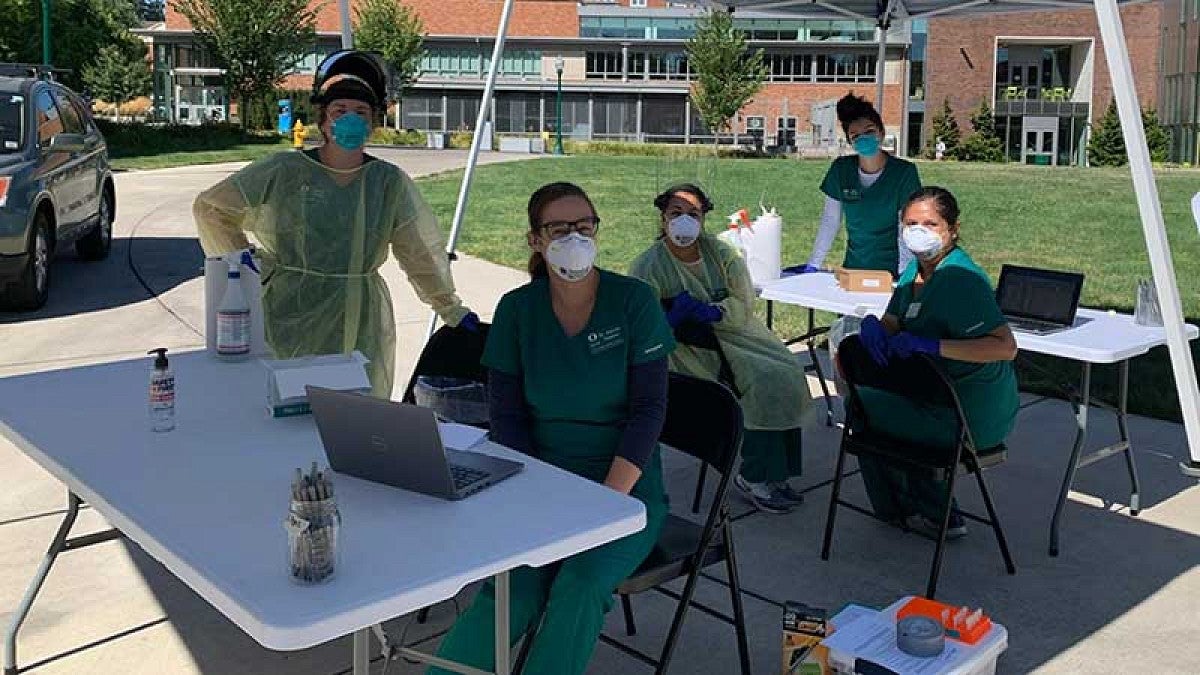A new two-year, $4.9 million grant from the National Institutes of Health will expand COVID-19 testing to underserved Latinx communities in six Oregon counties using testing capacity created by the UO’s COVID-19 Monitoring and Assessment Program.
“In Oregon, Latinx community members make up 13 percent of the state’s population, but represent 44 percent of COVID-19 cases,” said Leslie Leve, science co-lead for the monitoring initiative and a professor in the Prevention Science Institute and College of Education. “This grant will enable us to implement a critical community outreach and testing program to increase the reach, access and uptake of testing in communities with an urgent need.”
Along with Leve, the team of principal investigators includes UO biologist Bill Cresko and UO prevention scientist David DeGarmo. The co-investigative team includes more than a dozen experts in COVID-19 testing, Latinx community engagement, implementation science and data science.
For example, College of Education professors Stephanie DeAnda, Anne Mauricio, Elizabeth Budd and Ellen McWhirter are lending their expertise in bicultural and bilingual community outreach and implementation science to help the team design outreach and intervention strategies that are responsive to Latinx community needs and preferences.
The UO is one of 32 institutions to receive NIH funding through the Rapid Acceleration of Diagnostics Underserved Populations program, also called RADx-UP, to expand COVID-19 testing strategies in populations disproportionately affected by the pandemic. Working in partnership with local health authorities and community leaders, members of the UO’s COVID-19 Monitoring and Assessment Program team will focus on Latinx communities in 36 communities in six Oregon counties, including Lane and Marion counties.
The study will build on the accomplishments of the team, which has been conducting diagnostic testing since summer, including the establishment of a certified laboratory and the development of well-honed molecular testing protocols. The group’s laboratory personnel and field research teams have established strong relationships with county public health offices and hospitals throughout the state to conduct testing.
A key component of the project is to deliver a culturally tailored approach to testing and community outreach that focuses on equity and applies lessons learned from comprehensive community assessment on the best modes of communication, health messages and testing protocols. The team includes faculty members and students who are bicultural and bilingual, some who have staffed multiple county-led testing sites serving Latinx communities.
The project will use a novel research design, called a Sequential Multiple Assignment Randomized Trial, an adaptive intervention design that adapts or modifies the testing approach or dosage during the course of the study based on whether the site is testing at capacity or not.
“The beauty of the design is that it will test several strategies in sequence to show which approach works best for engaging and testing disproportionately affected communities,” said DeGarmo, science co-lead.
The team’s approach includes testing whether testing and health behaviors increase after deploying peer health workers to promote the testing events and provide information about how to prevent the spread of COVID-19. Additionally, some community testing sites will be moved to new locations to see if the change in venue increases the use of testing.
“Ultimately, the project will lead to a significant increase in COVID-19 testing that should help reduce health disparities in underserved populations,” said Cresko, co-science lead, professor of biology and executive director of the UO’s Data Science Initiative.
The larger aims of the NIH RADx-UP initiative include:
- Supporting research to better understand COVID-19 testing patterns among underserved and vulnerable populations.
- Strengthening the data on disparities in infection rates, disease progression and outcomes.
- Developing strategies to reduce the disparities in COVID-19 testing.
“It is critical that all Americans have access to rapid, accurate diagnostics for COVID-19, especially underserved and vulnerable populations who are bearing the brunt of this disease,” said NIH Director Francis S. Collins. “The RADx-UP program will help us better understand and alleviate the barriers to testing for those most vulnerable and reduce the burden of this disease.”
—By Lewis Taylor, University Communications


